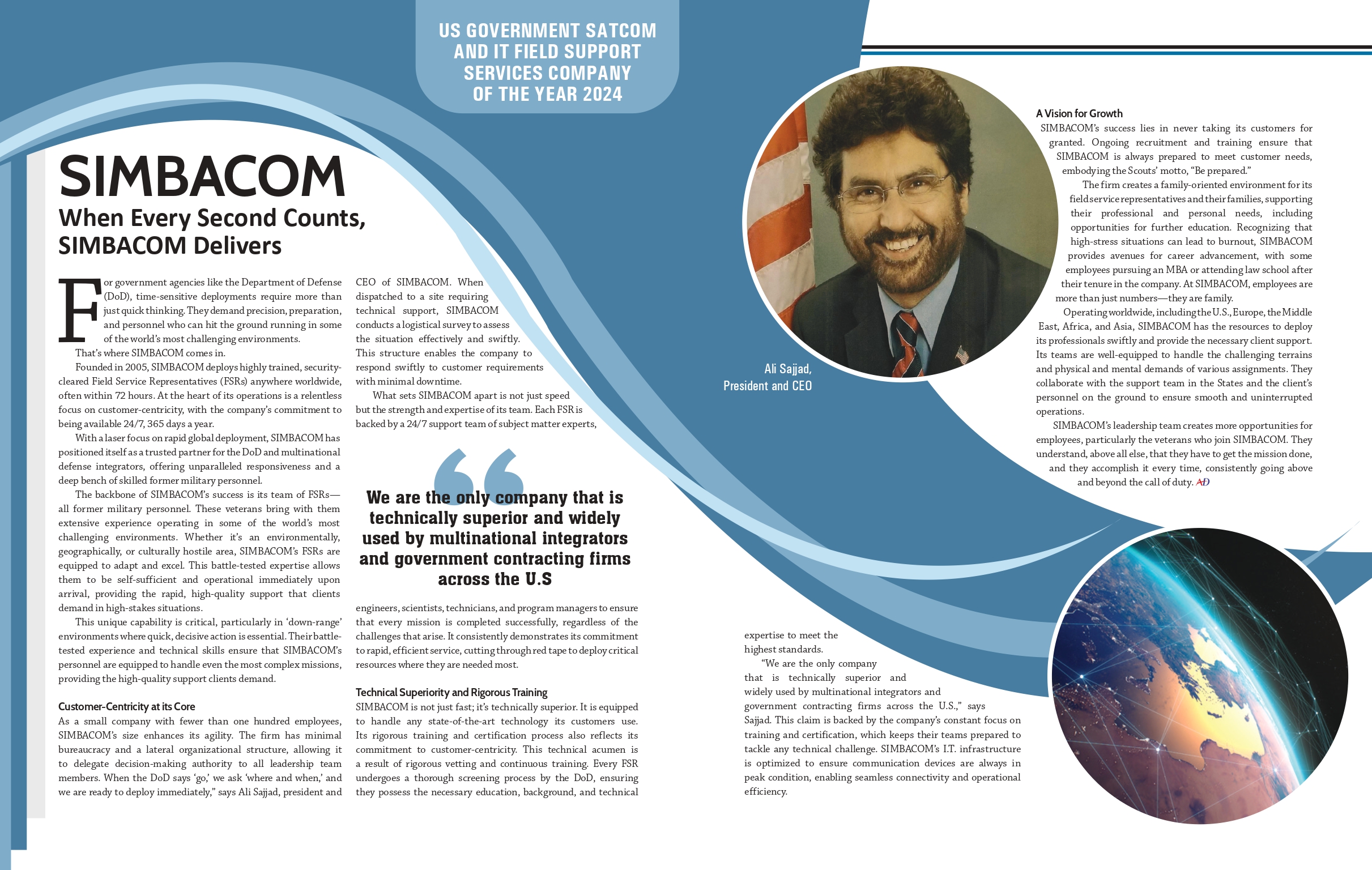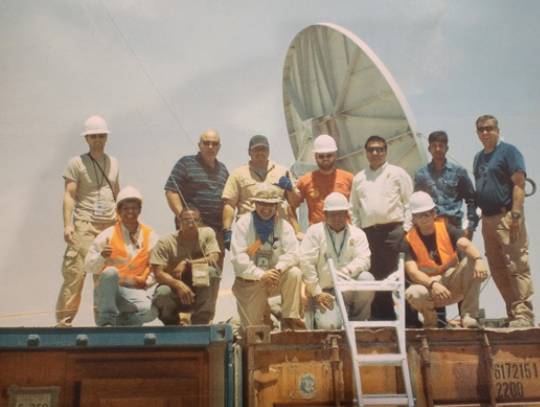SimbaCom News
Achieved And Accomplished :
By SIMBACOM And Their Partners
In The Year 2024


Veterans: The Backbone of Success
at SimbaCom
Almost 95% of SimbaCom’s hires for forward-deployment tech support assignments
have been veterans. “We hire from all branches of the military,” says Jon Joshlin,
SimbaCom’s Director of Technical Services and a 15-year Army veteran himself. “We
value their work ethic, their discipline, and their intuitiveness.” Joshlin makes a point of
making the circuit of bases when he’s stateside to proactively recruit active-duty
soldiers as they near the end of their military careers. “We look for people with the right
attitude,” Joshlin shares. “We prefer candidates with technical skill sets. But we also
provide additional tech training.”
New hires are typically put through an intensive training program at SimbaCom’s
headquarters in Leesburg, VA, before receiving their first deployment. Sometimes, that
first mission may not come immediately, as SimbaCom has learned to keepadditional
personnel on the roster so it can meet a client’s unexpected need for qualified experts to
deploy at a moment’s notice to a forward operating site.
Veterans understand these scenarios as well as the types of missions and environments
that they can encounter as SimbaCom employees. Most veterans sign on with
SimbaCom as Field Service Representatives, or FSRs. The work often involves long
stints abroad where living conditions can range from less-than-ideal to primitive. But, on
occasions, one lucky FSR may end up at a cool resort as well. It’s just the luck of the
draw.
The veterans that join the SimbaCom family appreciate the full package that comes with
their new employment: a good salary, full benefits, and a sense of belonging and
stability. As much as failures are not an option, “We allow our employees to make
mistakes and to grow from them,” Joshlin says. “We provide them with a soft landing
zone that just feels familiar and comfortable.” That approach, which is quite different
from other corporate strategies, provides veterans a welcome sense of stability. They
also just enjoy working side-by-side with other ex-military colleagues, as there is a
shared sense of common experience and mindset. “They don’t mind the hazardous duty,
“Joshlin explains. “They get paid handsomely, and they get to wear civvies!”
A serious and unstated perk of signing on is that “Ali (Ali Sajjad, SimbaCom’s founder
and CEO) takes care of his people to the ends of the Earth,” according to Joshlin. “Our
people are the very foundation of the success we have built here at SimbaCom,” Dr.
Sajjad explains. “It’s only natural to want to take care of these very talented, very
dedicated young men and women who make us look good all over the world.”
Looking to the future, SimbaCom is trying to build more opportunities for its Band of
Brothers and Sisters—trying to expand both its commercial work and the number of
contracts that provide work stateside. The leadership team is focused on growing the
company, which, in turn, will provide even more opportunities for employees, and
especially the veterans who come to work for SimbaCom. “They understand above all
else that they have to get the mission done,” Dr.Sajjad explains, “and they get it done
successfully every time. They are used to going above and beyond the call of duty.”

LEOs Making In-Flight Connectivity Possible?

OneWeb, is also looking to use its growing constellation of multi-orbital satellites to serve this
market as well. No matter what the final architecture looks like, there is no doubt that the
solution will involve many players bringing lots of innovation and integration to the table.
Source: Via Satellite. You can visit the full story here.
https://www.satellitetoday.com/mobility/2023/09/08/leo-operators-pitch-the-orbits-value-for-
ifc-at-connected-aviation-event/
Satellite operators building constellations in Low-Earth Orbit (LEO) are projecting that, by 2030,
50% to 70% of airlines will adopt this technology to provide in-flight connectivity for their
passengers. There is already pressure on the airline companies to provide gate-to-gate service,
and that will only increase over time. To meet the demand, Amazon is working on Project Kuiper
, an initiative to increase global broadband access through a constellation of 3,236
satellites in LEO. The first two prototype satellites are set to launch this fall.
Phillippe Schleret, Telesat’s vice president of aviation, says the company is building a LEO
constellation from the ground up with in-flight connectivity being one of its target markets.
The goal, he says, is to create consistent, superior customer experience with full global service,
including around the poles, anywhere on the ocean, and at busy airport hubs.
SimbaCom Responds to Hurricane Ian
SimbaCom is assisting with the restoration efforts
following Hurricane Ian, which made landfall on September 28 in southwestern Florida
as a powerful Category 4 storm. Heavy rain pummeled the region, and a powerful 12-
foot storm surge devastated the communities all along the coast. Officials anticipate that
recovery and rebuilding efforts will be ongoing for months.
Responding to the need, two SimbaCom employees headed down to Ft. Meyers, which
sits at Ground Zero of the catastrophe. The Simba team is partnering with SES, SES
Government Services, Walmart, and Amazon to help restore critical communications for
first responders so residents can connect with the resources they need.
“Hurricane Ian had a devastating impact on thousands of Floridians,” says Ali Sajjad, President of SimbaCom. “SimbaCom has volunteered to support our teaming partners in the disaster relief effort. We hope and pray that God gives all the families affected by this horrible disaster the courage to bear their loses and the strength to move forward.”
SimbaCom expects their team members to return to the Leesburg area on October 15.

Our Achievement 2024


